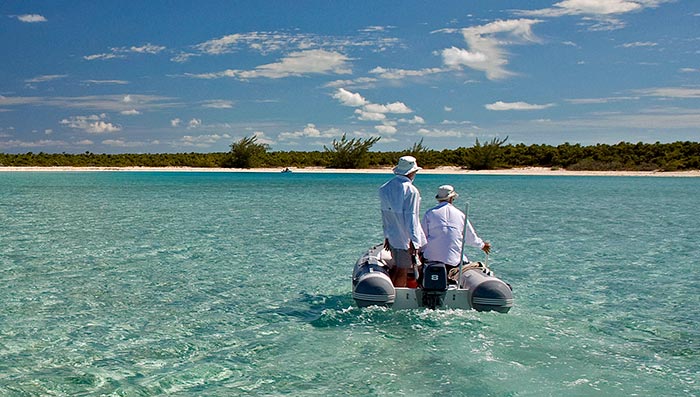Advertisement

Brian Munroe and Lynn Bamberger take the dinghy ashore at Cambridge Cay in the Exumas, Bahamas. The photograph, a finalist in our photo contest, was taken by James Forsyth of El Cajon, CA.
In our work as charter brokers and flotilla leaders, my husband Peter and I have organized and lead 55 flotilla charters all over the world for our own company, and for magazines. Our trips range from the adventurous to the luxurious, and everything in between. No matter what kind of charter it is, though, and how many times I pack for a boating trip, I still have to think about what the next adventure entails – what the weather will be like, what are the ports of call, what unique events are planned. But the essentials remain the same. We use a rolling duffel bag that's fully collapsible for ease of storage on the boat, and I always bring the following:
Clothing
- Two sarongs. They work as cover-ups, beach towel, skirts, or a tablecloth!
- T-shirts, zip-off slacks (creating shorts), and quick-drying underwear
- Hat and loose, long-sleeve light shirt for sun protection
- Flip-flops for showers at a marina
- Keens or other similar waterproof shoes that offer toe protection
- Rain gear – lightweight, heavyweight, or cheap poncho (it covers a backpack)
Toiletries
- Sunscreen and sunglasses
- Just in case, bring Pepto Bismal, seasickness medicine, Neosporin, ibuprofen, bandages, and moleskin
- Small travel sizes of toiletries now readily available, just enough for your trip
- Insect repellant
- Prescriptions
- Extra contact lenses, and prescription glasses as backup
Electronics
- Camera, extra media, spare battery, plus 12-volt inverter to charge batteries (all available at Radio Shack)
- Dry bag for camera and other non-waterproof things
- Small flashlight for finding your boat or the keyhole
- Small LED headlamp for reading in bed
- Hand-held GPS and VHF
- Extra batteries
- Small calculator
- Plug adaptors if traveling in Europe
Advertisement
Miscellaneous
- Zip-lock bags for galley
- Favorite herbs and spices (in plastic film containers or similar) to add zing to simple dishes
- My ditty bag with extra line, a Leatherman or folding knife, more clothespins
- A small notebook for notes about the trip
- Small backpack for going ashore
- Security pouch for wearing under a shirt
- Copies of our passports, kept separately
- PADI or other diving credential
- Small alarm clock
- Rip-stop bag (folds small) for carrying groceries or beach stuff
- Pocket packs of tissues, and antiseptic sachets for wiping hands, to keep in your backpack
- Tiny bottle of iodine for purifying water
- Net bag to keep your snorkel gear separate in the lazarette, easy to grab, and easy to carry in the dinghy
Before You Leave
- Take credit cards and ATM cards; call your credit-card issuer to alert them that you'll be in a different location, or when they see foreign charges, they may think someone has stolen your card, and suspend it.
- Pack light, and pack everything in zip-lock bags in case your duffel is left on the runway in the rain, or a container of liquid leaks, or there's an unexpected leak in the boat. Also, everything stays neatly folded even if you or airport-security rummages through your bag.
- Make sure you leave your air and travel schedule with someone at home.
A Tip On Sharing Expenses
When a group of friends gets together on a charter, it's easy for finances to get confusing. Who pays for what? Who's turn is it to cover dinner? Last night we ate at a cheap place, but tonight's place is more expensive; how should we handle this so everyone pays their fair share? Here's an easy way to sort it out.
On Day One, create a "boat bank" and have everyone on your charter boat put $200 into it. It's a good idea to keep this money in a separate wallet for this purpose. One person volunteers to handle the money, keep it separate from his or her own, and pay for absolutely everything that is shared — cabs, mooring fees, dinners, tips, extra provisions picked up along the way, dockage, you name it. When the bank runs low, the "pursor" asks everyone for another $100 (or whatever seems right). When someone other than the purser pays for something that's for everyone, he or she gets reimbursed from the boat bank. If one person tires of being purser, the responsibility can be shared. At the end of the trip, whatever the bank has left is divided equally. Simple. Fair. No misunderstandings. No discussing the dinner bill.
– Bernadette Bernon
